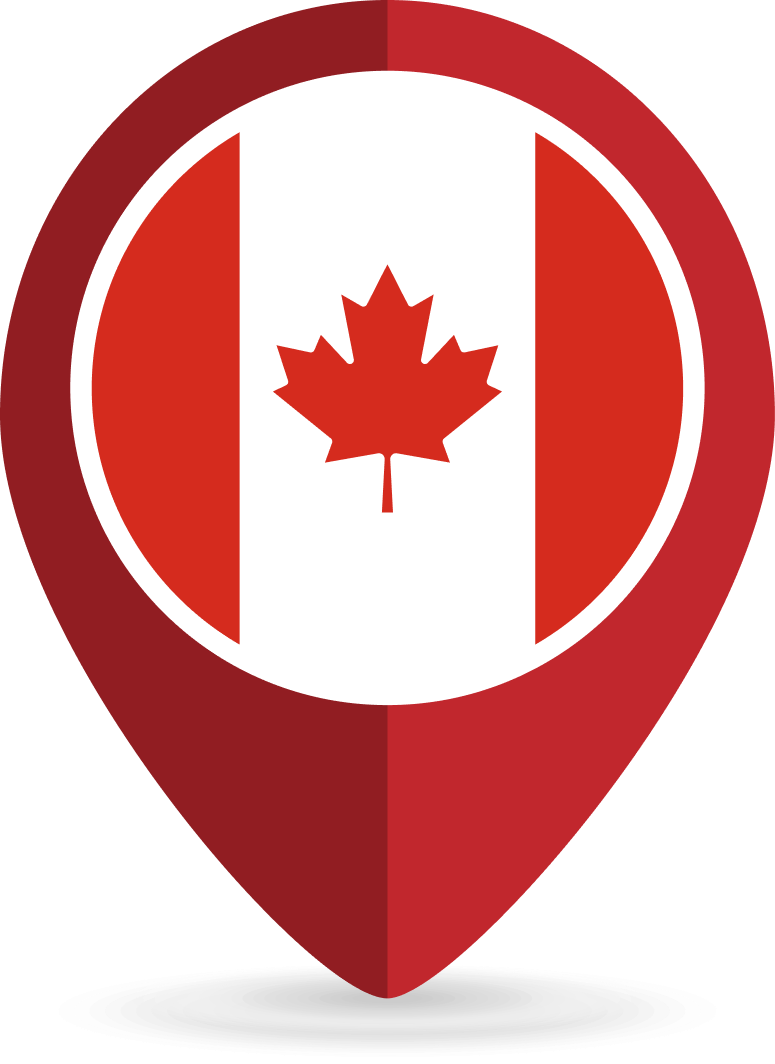Student Life in Canada – Cost, Culture, Work Opportunities, and More
Canada stands out as one of the top choices for students seeking education abroad. This welcoming country provides international students with a high-quality student life. Canadian universities consistently rank among the best globally, offering exceptional education and enriching the student experience. The allure of vibrant cities, promising career prospects, multicultural diversity, and a high standard of living attracts a significant number of international students to pursue higher education in Canada each year.
In Canada, international students can easily find affordable accommodation options that are readily available. Compared to other international destinations, the cost of living in Canada is relatively low. The Canadian lifestyle is both enriching and rewarding for students from around the world. Canadian universities and colleges offer outstanding facilities, sports, extracurricular activities, and cultural programs, fostering integration with Canadian culture. Students enjoy their time here, often deciding to make Canada their permanent residence.
Student Accommodation in Canada
1. On-campus housing
On-campus housing refers to accommodation provided within the premises of a college, school, or university. These educational institutions offer various types of on-campus housing options, including dormitories, residence halls, townhouses, and apartments. Students residing in on-campus housing typically share a room with fellow students and have access to essential amenities. As these accommodations are located within the campus, they provide a secure environment, and the institution usually provides utilities and other necessary services.
2. Homestays
Homestays are a popular accommodation option in Canada, where local residents open up their homes to international students. These homestays provide well-furnished rooms equipped with all necessary utilities. Opting for a homestay allows students to immerse themselves in Canadian culture and experience firsthand interactions with Canadian hosts. Staying with a Canadian host offers a friendly and comfortable environment, enabling students to enjoy a more authentic and enriching experience during their stay.
3. Private Rentals
Private rentals offer a range of apartments available for rent to international students. Students have the option to choose a personal room or share a room with others to split the rent. When moving in, a security deposit along with one month’s rent is typically required. Private rentals generally provide well-furnished or semi-furnished rooms, but do not include meals. Students are responsible for paying their own utilities and bills separately.
4. Temporary Accommodation
In situations where students need immediate accommodation upon arrival, it is advisable to consider temporary options such as hotels. Staying in a hotel for a short period allows students to settle in and attend to their immediate priorities. Once they have taken care of their initial tasks, they can then focus on finding a more suitable and long-term accommodation solution.
International Student Life in Canada
If you’re looking to study in a country with a diverse population, Canada stands out as the ideal study destination. People from all corners of the globe choose Canada for their higher education and career prospects. The country is home to various ethnic communities, including Canadians, English, Scots, French, Irish, and Indians. One fascinating aspect of life in Canada is the significant role that immigrants play in the country’s progress, growth, and development. In fact, it may surprise you to know that Canada surpasses the United States as the world’s largest importer of human capital, attracting a greater number of immigrants. Canadian culture is a beautiful blend of social, political, artistic, musical, literary, and culinary influences, reflecting the diversity and richness of its people.
Historically, Canada has been renowned for its warm welcome and hospitality towards immigrants from diverse backgrounds. As an international student embarking on your educational journey in Canada, you can expect to encounter multicultural communities that are accustomed to interacting and engaging with individuals from different nations. This unique aspect of Canadian student life can significantly contribute to your sense of comfort and belonging in your new environment. Thanks to Canada’s high rate of immigration, you will find a rich tapestry of cultures and religious communities thriving within the country’s borders.
While Canada is indeed renowned for its love of hockey, the country offers much more than just sports. It boasts stunning architecture, captivating art forms, thrilling theater performances, globally celebrated festivals that attract renowned celebrities, and a multitude of casinos and clubs. Canada is a vibrant and lively destination that caters to a wide range of interests. Moreover, the country’s cuisine is incredibly diverse, ensuring that regardless of your cultural background, you will find a variety of food options to suit your tastes.
In addition to its cultural offerings, Canada is home to several prestigious world-class universities. International students who choose to study in Canada can expect to receive a high-quality education within a welcoming and inclusive environment. The Canadian government places great emphasis on the importance of education and is committed to ensuring that students receive the best possible learning opportunities. In fact, Canada has one of the highest investments in education globally, reflecting its dedication to providing exceptional educational experiences to both domestic and international students.
Canada is highly favored among international students due to its numerous benefits. It offers a range of on-campus programs designed to facilitate student integration, as well as immigration programs aimed at assisting with permanent residency applications. As the number of international students in Canada continues to rise, the government and educational institutions are actively developing plans to enhance student life and support those interested in working and living in the country after their studies. Canadian universities and colleges prioritize the integration of international students into various campus communities and programs. Additionally, many institutions offer competitive financial assistance to students with outstanding academic achievements. These aspects collectively contribute to making international student life in Canada highly appealing.
The Cost of Studying in Canada
Canada is renowned for its multicultural environment, friendly populace, and the wide array of leisure activities it offers, all of which contribute to its appeal as a destination for international students. One significant advantage of studying in Canada is its affordability compared to other overseas education destinations. International students can expect to spend between INR 3,50,000 and INR 19,00,000 annually on tuition fees, although this can vary depending on the institution and program of study. Recent data suggests that tuition fees for international students have increased by 7.6%. Here is a breakdown of the average cost of studying for international students in Canada:
1. Undergraduate degrees — $13,000 (INR 7,53,905) to $20,000 (INR 11,59,855)
2. MBA — $30,000 (INR 17,39,782) to $40,000 (INR 23,19,710)
3. Doctoral degree — $7,000 (INR 4,05,949) to $15,000 (INR 8,69,891)
4. Postgraduate master’s degree — $17,000 (INR 9,85,876) to $25,000 (INR 14,49,818)
The tuition fees for private and public universities and colleges are not the same. Public sector educational institutions have a low fee structure, while private ones are a little more expensive. Here is a list of some of the top universities and colleges with their fee structures.
1. University of Montreal — $13,048 (INR 7,56,689) —-$16,990 (INR 9,85,296)
2. University of British Columbia — $8,605 (INR 4,99,027) — $36,588 (INR 21,21,838)
3. University of Toronto — $6,990 (INR 4,05,369) — $48,880 (INR 28,34,685)
4. Mc. Gill University — $16,815 (INR 9,75,148) — $45,623 (INR 26,45,803)
5. Mc. Master University — $16,762 (INR 9,72,074) — $27,978 (16,22,521.34)
6. University of Fredericton — $7,416 (INR 4,30,074)— $30,385 (INR 17,62,109)
7. Yorkville University — $10,057 (INR 5,83,233) — $21,075 (INR 12,22,197)
8. The King’s University—$9,812 (INR 5,69,013)
9. St. Mary’s University — $26,910 (INR 15,60,553)
Indian Student Life in Canada
- Affordable Cost: Canada offers more affordable tuition fees and lower living expenses compared to other popular study abroad destinations such as the USA and UK.
2. High Standard of Living: Canada provides a high standard of living and quality of life, making it an attractive choice for Indian students. The country is known for its safety and security, further enhancing its appeal.
3. Prestigious Universities: Canada is home to world-renowned universities, including the University of Toronto, University of Waterloo, McGill University, and University of Alberta, among others. Indian students value the academic reputation of these institutions.
4. English as the Primary Language: English is widely spoken and understood in Canada, making it easier for Indian students to communicate and adapt to their surroundings. Additionally, Canada’s diverse culture fosters interaction with people from various backgrounds, including fellow Indians.
5. High Employability: Canada offers excellent employment prospects for international students. The Ministry of Education encourages the admission of foreign scholars, creating a cosmopolitan environment that facilitates adaptation and engagement. Canadian institutes are globally recognized for their research contributions in various fields.
Culture and Food in Canada
Canada is known for its warm and welcoming locals who extend love and respect to international students. The multicultural environment plays a significant role in fostering peace and creating a vibrant cultural mix. Canadian culture is a blend of American, British, and French influences, resulting in a diverse and rich cultural tapestry that encompasses festivals, sports, and cuisine.
The influence of French culture is particularly prominent in Quebec, where one can experience famous French cuisine and admire the region’s distinctive architecture. Iconic Canadian dishes like poutine and meat pies showcase the country’s culinary heritage.
Canada is a hub of food festivals, street cultural activities, breathtaking landscapes, and, of course, the beloved sport of hockey. International students will find themselves embraced and included, regardless of the part of Canada they choose to settle in.
Work and Study in Canada
International students hold Canada in high regard for its exceptional education facilities, abundant job prospects, diverse specializations, and promising research opportunities. The country boasts several universities and colleges that rank among the top 100 globally, including renowned institutions like the University of Toronto, University of British Columbia, University of Alberta, McGill University, and McMaster University. These institutions enjoy a strong global reputation and provide international students with prestigious and valuable degrees.
Canada offers a wide range of degree programs and specializations to cater to students from various academic backgrounds. Popular courses pursued by international students in Canada include medicine, nursing, business administration, management, finance, information technology, engineering, bachelor’s degrees, design, law, and architecture. The availability of such diverse and high-quality programs attracts students from around the world to pursue their desired fields of study in Canada.
Canada has emerged as a top study destination for international students due to its post-graduation work permits and abundant part-time job opportunities. International students in Canada can work up to 20 hours per week during their studies and full-time on weekends and during vacations. The country is home to multinational companies and conglomerates that offer competitive salary packages to students.
One of the advantages of studying in Canada is the post-graduation work permit, which allows students to extend their visa and search for employment opportunities. This provides an opportunity for international students to gain valuable work experience and potentially settle down in Canada. Work visas and permanent residency options are available for students who meet the eligibility criteria and wish to contribute to the Canadian economy.
Canada has a robust job market and is considered one of the developed economies globally. It offers a wide range of high-paying job opportunities across various sectors. Fields such as Engineering, Information Technology, Data Analytics, MBA, Finance, Human Resources, Design, Law, and Medical professions are particularly sought after by employers in Canada.
The combination of quality education, job opportunities, and the potential for long-term career prospects makes Canada an attractive destination for international students seeking to pursue their studies and establish a successful professional career.
Leisure Activities and Affordable Travel options
Canada offers a plethora of leisure activities for both locals and international students. The country’s residents have a vibrant and active lifestyle, engaging in a variety of recreational pursuits. Some popular activities in Canada include bicycling, curling, reading, horseback riding, bowling, golfing, walking, skating, hiking, cooking, skiing, and swimming.
Canadian people are known for their love of outdoor activities and appreciate the beauty of nature. They enjoy exploring the diverse landscapes, national parks, and trails that Canada has to offer. From leisurely walks in urban parks to challenging hikes in the mountains, there are activities suitable for every interest and fitness level.
In addition to outdoor pursuits, Canadians also appreciate indoor activities such as reading, dining out, weekend getaways, watching movies, and engaging in regular exercise. The country has a thriving arts and cultural scene, with numerous theaters, art galleries, and music venues where international students can immerse themselves in the local arts and entertainment.
Overall, international students studying in Canada will find a wide range of activities and opportunities to explore during their leisure time. The country’s fun-loving and adventurous nature, combined with its emphasis on work-life balance, ensures that there is always something exciting to do or discover while living and studying in Canada.
Canada boasts a robust and efficient transportation system, facilitating convenient travel within and between cities. The Toronto Transit system, known as the TTC, is the second-largest in the world and offers extensive public transportation options. These include cars, buses, subways, streetcars, metro systems, Link Trains, and light rail trains.
Public transportation in Canada is well-developed, ensuring connectivity throughout the country. The transportation networks are comprehensive, making it easy for residents and international students to navigate and explore different regions. The cost of using public transportation in Canada is generally affordable compared to other countries.
For instance, a monthly transport pass in major cities like Toronto costs around $151.15 (INR 8,765.61). Single-use bus tickets typically cost around $3.25 (INR 188.48), and taxi fares average around $2 (INR 115.99) per kilometer. In addition to buses and taxis, Canada also operates three rapid train systems: the Montreal Metro, Vancouver SkyTrain, and Toronto Subway.
The Link Train, which operates 24 hours a day, is a free transportation service available at certain airports and is wheelchair accessible. This provides convenient connectivity for travelers and commuters alike.
Overall, Canada’s multimodal transportation system ensures efficient movement within cities and convenient travel options for international students to explore different parts of the country.
Canadian SIM
Certainly! In addition to its efficient transportation system, Canada also offers convenient options for communication through mobile services. International students can easily obtain a Canadian SIM card to stay connected during their stay in the country.
Acquiring a Canadian SIM card allows international students to have a local phone number, access affordable calling rates, and enjoy data services. With a Canadian SIM card, students can make local and international calls, send text messages, and use mobile data for various purposes, such as accessing the internet, using social media, and staying in touch with family and friends.
To obtain a Canadian SIM card, international students can visit here and follow the registration process, which typically involves providing identification documents and completing necessary paperwork. Once activated, the SIM card can be inserted into a compatible unlocked phone, allowing students to enjoy seamless communication throughout their Canadian journey.
Conclusion
Related Posts



















